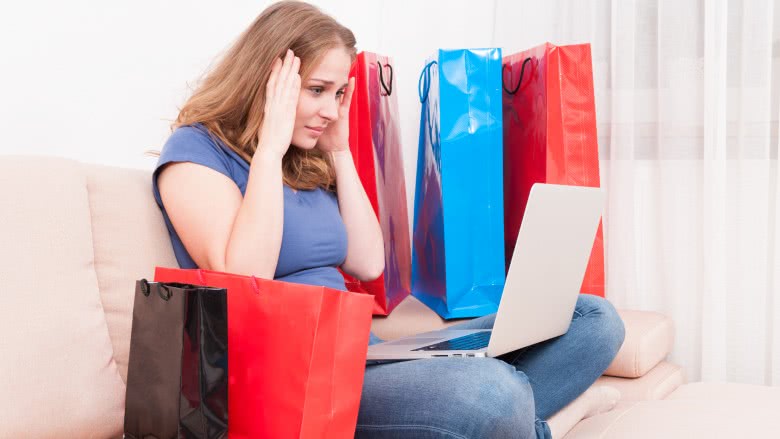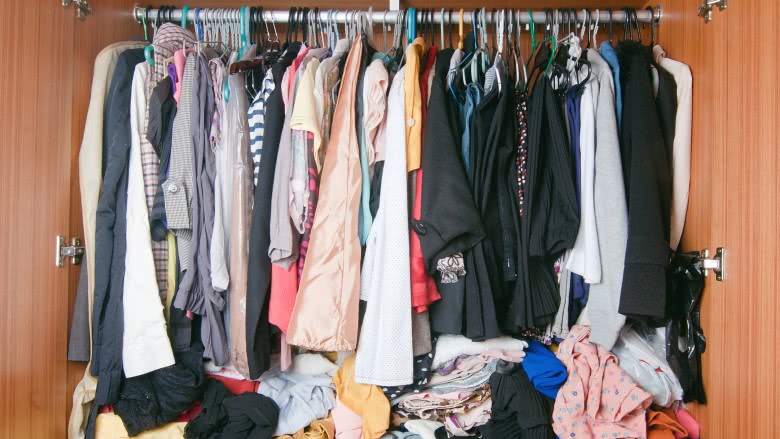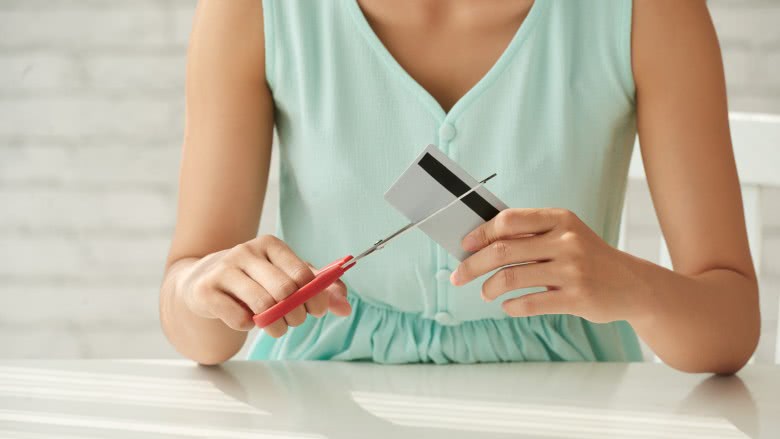Signs You Might Be A Shopaholic — And Why It's A Big Deal
Depending on what you're looking for — and maybe who you're with — shopping can be a really fun outing. There's something exciting about acquiring something brand-new, or at least, new-to-you. Trying on clothes or browsing at a bookstore, near jewelry cases, or in the shoe department can cheer you up or at least be preferable to other chores or dwelling on worries. After all, the term "retail therapy" wasn't created for nothing.
If you can't go near a store without making a purchase or use shopping as a coping mechanism, though, you may have crossed over to shopaholic territory. "Shopaholics are addicts — they are powerless to stop shopping and spending," Laura MacLeod, licensed social worker and founder of From the Inside Out, told me via email. "They may be in extreme debt, lose their home, live in clutter, jeopardize relationships by lying to partners and spending money set aside for children or retirement. At the very least, shopaholics live with guilt, shame, and sense of hopelessness." You may think that MacLeod's description doesn't sound like you, but there are also some more subtle signs that your shopping may be more than a chore or fun, occasional hobby. And if you are a shopaholic, what does that mean in terms of short-term and long-term effects? Your shopping addiction could cause obvious problems like debt, but it could affect you and those around you in other, far more subtle ways, as well.
You're living beyond your means
While not all shopaholics are deep in debt — and certainly not everyone in debt is a shopaholic — living beyond one's means is a telltale sign that you might have a shopping issue. "It's very healthy just to look and see, 'Why am I in debt?' just to give a moment to analyze that," Natasha Rachel Smith, consumer affairs expert at TopCashback, told me. "If you can pinpoint why you owe money, you bought a car, you needed to furnish your home, that's good debt, if it's managed appropriately, if you can get it at a cheap interest rate, and you've put a lot of thought into it. Bad debt is when you have no idea what you've spent the money on and the little numbers really, really do add up." Smith suggested studying your credit card statements and if you can't identify a purchase based on the numbers listed, it might be an indicator that there's more going on than that you just needed to buy more that month.
You're hiding your purchases
Obviously, hiding gifts and things like that isn't what I'm talking about here. That's something everyone does and is for the good of whoever you're going to be giving that thoughtful gift to. If you're trying to avoid those in your life when bringing home purchases (or hiding them even once you get them home), though, you might be a shopaholic, said David Bakke, the personal finance expert at Money Crashers. Hiding what you buy shows that you know there's something about the behavior that means you shouldn't be doing it anymore. Maybe you're embarrassed because you know you didn't have the money or because you know you don't need what you bought. Maybe you're worried that someone will tell you off for making the purchase. Whatever the reason, if you're hiding things after you hit the mall, you might need to reflect on what's going on in the background.
You want to shop less, but can't
If, try as you might, you can't stop buying things, that might be a sign that you're a shopaholic. MacLeod noted that many people who may be on the way towards a shopping addiction recognize that they need to stop spending as much and as frequently as they are, and perhaps even make a budget and other plans to do so, but then find all kinds of reasons for why their plan won't work or they can't stop shopping right now. Your shopping habit may have spiraled out of control if want to stop shopping but keep finding things you have to have.
Your shopping is keeping you from achieving your goals
This sign might just be the most subtle of all the signs on this list. It can be difficult to determine if it's your shopping that's holding you back or keeping you from accomplishing things you've set out to do, but if it is, it could be a sign that's it's a problem, according to Benjamin Glaser, retail analyst and features editor at DealNews. Can't work on that big project that would land you a much sought-after promotion because you spend most of the day shopping online? It may not seem like your spending habit is affecting other things in your life, but in this case, it had an awfully big impact.
You're buying things you don't need
Everyone buys things they probably don't really, truly need from time to time. It happens. According to Smith, "unused items are the biggest visual sign to identify a shopaholic." These things can be a closet full of clothes with tags left on them, cupboards filled with unused kitchen appliances, a basement or garage filled with exercise equipment gathering dust, or just about anything else. Andrea Woroch, consumer and money-saving expert, told me via email that sales can also lead to unneeded purchases because you justify buying the item since it seems like such a great deal. Just because the price looks great doesn't mean that it's something you have to have.
Smith recommends combating the urge to buy things you don't need by asking, "Do I need it? Can I afford it? Will I use it?" If you don't really need it, it might be best to walk away.
You have a collection of store credit cards
You know how you regularly get asked if you'd like to save more on your purchase by opening a store credit card? Sometimes, it can be really, really tempting to take the cashier up on that offer. If you have a lot of store credit cards, however, that might be a subtle sign that your spending habits are problematic. According to J.R. Duren, a personal finance reporter at highya.com, store credit cards can be a bit dangerous. "Store credit cards often have high APRs, which means any balances that you keep on those cards will cost you a significant amount of interest fees. Store credit cards are also very one dimensional: you can typically only use their rewards and benefits at their stores, which is very different than cash-back credit cards," Duren told me via email.
Additionally, because of the aforementioned credit card pitch at the register, you may end up signing up for a card without knowing all the details about it, which can be dangerous for shopaholics in particular, Duren added. If you don't know the terms of the card, you may be setting yourself up for trouble down the road.
Your shopping is driven by your emotions
Beelining it to the mall because you're celebrating something or devastated by something might be a sign that you're dependent on shopping to make you feel better — an indicator that you might be a shopaholic. As Woroch wrote in a guest-post for Ready for Zero, "Having shopping intertwined with emotion is one of the most common causes of compulsive buying. Whether it's the feeling of a post-purchase rush or rewarding yourself for a minor victory, these connections can cloud your judgment and lead to unnecessary spending."
Smith noted that avoiding your credit card statements due to emotion can also be a sign that your shopping habit is out of control. It can be depressing to realize how much you've actually spent and, as Smith mentioned, if you're shopping to escape from feelings of depression in the first place, that can make things worse.
What's the big deal?
A shopping addiction can have far-reaching consequences. It can, obviously, result in debt, depleted savings, and poor credit, but what about the less well-known ramifications? One that you may or may not consider is the toll that it can take on the relationships you have with people in your life. According to Glaser, shopping addictions can lead to "shattered relationships." Why? Because between the financial issues, hiding or lying, and spending so much time shopping, it can create big problems that last for quite a long time.
What can you do to try to help change your shopaholic ways?
The first thing that you need to be able to do, according to Smith, is admit that you're a shopaholic. Acknowledging it to yourself helps you face it head-on, so you're more prepared to tackle all the work that's left to do. Next, implement her pre-purchase mantras every time you find yourself reaching for your wallet. They'll help you discern if the purchase is really the right one to make or not. Smith also says it's important to realize that shopaholics are still going to have the urge to shop and they'll still need to buy some things from time to time. While curbing your spending is essential for long-term success, completely eliminating ever buying anything isn't likely to work in the real world.
Still, it's important to spend as smartly as you can. "Maybe even challenge yourself so it's like a treat. You are allowed to spend, but try and get what you need at the best price possible," Smith said. "You can use cash back websites like TopCashback for that, with coupons, with vouchers, you can negotiate, but if you're going to spend — you may still want that little bit of a kick from the action of it — try and protect yourself by doing it the smartest way possible." Protect yourself, protect your future.










